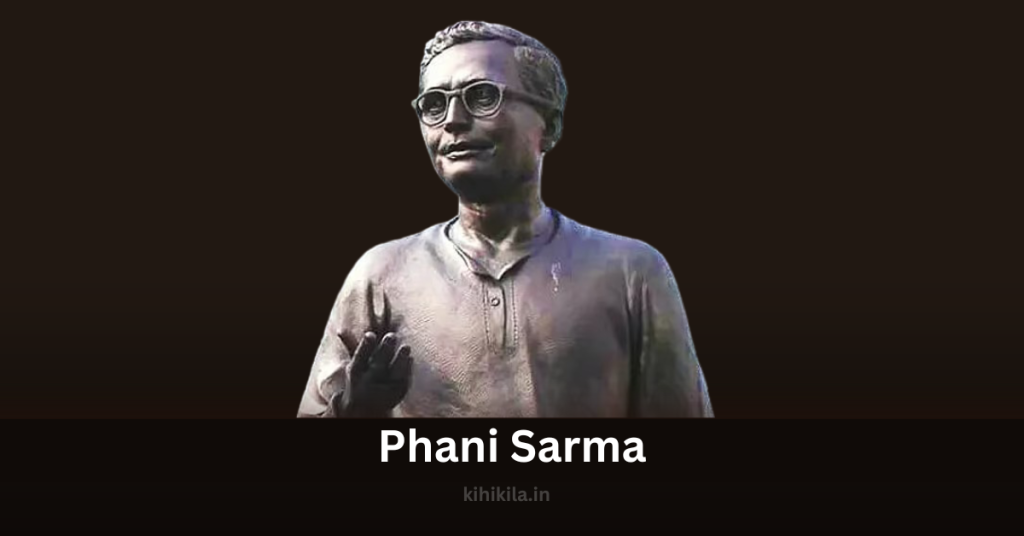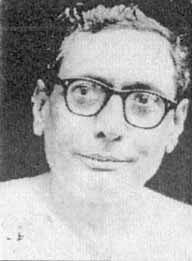Early Life and Inspiration
Phani Sarma, a name that resonates with Assamese theatre and cinema, was born in 1910 in Tezpur. His father, Molan Sarma, was a respected stage actor, and this early exposure to drama played a significant role in shaping Phani Sarma’s passion for acting. As a child, he regularly accompanied his father to the Ban Stage, where he closely observed the performances of seasoned actors like Indreswar Borthakur, Dr. Lalit Mohan Chowdhury, and Prafulla Borua.
Nicknamed Bolin, young Phani Sarma developed a deep admiration for the theatrical arts. His journey began in an unexpected way—as a gatekeeper for the women’s gallery at Ban Stage. However, in 1928, he finally stepped onto the stage, playing the role of Emperor Akbar in the drama Rana Pratap. This moment marked the beginning of an extraordinary career in Assamese theatre and cinema.
Contribution to Assamese Theatre
Phani Sarma was not just an actor; he was a force of nature in Assamese theatre. His imposing stage presence, rich voice, and ability to captivate audiences set him apart from his contemporaries. Over the years, he acted in more than a hundred plays, embodying diverse characters that left an everlasting impact on Assamese theatre-goers.

One of his most remarkable contributions to Assamese drama was his playwriting. He authored four full-length plays, with Bhogjara (Ceremonial Jug) in 1957 standing out as a masterpiece. Unlike conventional patriotic dramas of the time, Bhogjara explored themes of palace intrigue, adultery, and revenge, making it a unique addition to Assamese literature. His portrayal of King Lakshmi Singha in the play was unforgettable.
Recognizing his immense contribution, people fondly referred to Phani Sarma as Natasurya—the Sun of Assamese Drama. His ability to breathe life into his characters and engage audiences with sheer brilliance ensured his legacy as one of the greatest actors Assam has ever produced.
Film Career: A Pioneer in Assamese Cinema
Phani Sarma’s journey in cinema began with Joymati, the First Assamese Feature Film directed by Jyoti Prasad Agarwala. Released in 1935, Joymati featured Sarma in the role of Gathi Hazarika, the film’s villain. His powerful performance was a highlight, helping establish his reputation as a remarkable screen actor. He later appeared in Agarwala’s second film, Indramalati.
Notable Films and Directorial Ventures
- Siraj (1948): Phani Sarma, in collaboration with Bishnu Rabha, co-directed Siraj. The film was an adaptation of a popular short story by Deshapran Lakshmidhar Sarma and was well-received for its storytelling and performances.
- Pioli Phukan (1955): In this historical drama, Phani Sarma took on the dual role of director and lead actor, portraying the legendary prince-turned-patriot Pioli Phukan. His gripping performance and cinematic vision made this film one of the most celebrated Assamese Movies of its time.
- Ito Sito Bahuto (1963): This was his final film appearance before his passing in 1970. Unlike his previous works, he appeared solely as an actor in this movie.
Influence on Mobile Theatre
With the advent of Bhramyaman Mancha or mobile theatre, Assamese theatre underwent a transformation. The movement provided new avenues for actors, and Phani Sarma embraced this change with enthusiasm. He remained actively involved in mobile theatre until his final days, proving his dedication to the art form.
Legacy and Lasting Impact
Phani Sarma’s contribution to Assamese culture is unparalleled. His ability to seamlessly transition between theatre and cinema, his compelling performances, and his innovative approach to storytelling cemented his place as a legend. Even today, Assamese theatre and cinema owe much to his pioneering efforts.
His passing in 1970 marked the end of an era, but his influence continues to inspire aspiring actors, playwrights, and filmmakers. Whether on stage or screen, his legacy as Natasurya remains immortal in the hearts of the Assamese people.
Phani Sarma was not just an actor or a playwright; he was a visionary who shaped the cultural landscape of Assam. His journey from a young boy mesmerized by theatre to a towering figure in Assamese performing arts is a testament to his passion, talent, and dedication. His name will forever shine in the annals of Assamese theatre and cinema.
FAQ’s:
Q 1. Who was Phani Sarma?
Phani Sarma was a famous Assamese theatre actor, playwright, film actor, and director. He was born in 1910 in Tezpur and made significant contributions to Assamese drama and cinema. People admired him for his powerful performances and deep understanding of storytelling.
Q 2. What was Phani Sarma’s first movie?
His first movie was Joymati, directed by Jyoti Prasad Agarwala. It was released in 1935 and was the first Assamese feature film. In this film, he played the role of Gathi Hazarika, the villain.
Q 3. Why is Phani Sarma called Natasurya?
He earned the title Natasurya, which means “The Sun of Drama,” because of his immense contributions to Assamese theatre. His acting skills, commanding presence, and ability to connect with the audience made him one of the most respected figures in Assamese performing arts.
Q 4. How did Phani Sarma start his career in theatre?
His journey in theatre began as a gatekeeper at Ban Stage in Tezpur. In 1928, he got his first acting role as Emperor Akbar in the drama Rana Pratap. This was the start of his long and successful career in theatre.
Q 5. Which are the most famous plays written by Phani Sarma?
He wrote four full-length plays, with Bhogjara (Ceremonial Jug) in 1957 being one of the most famous. This play stood out because it focused on palace intrigue, adultery, and revenge, rather than traditional patriotism.
Q 6. What are Phani Sarma’s most notable films?
Apart from Joymati, he played a key role in Indramalati. He co-directed Siraj in 1948 and later directed and acted in Pioli Phukan in 1955. His last film was Ito Sito Bahuto in 1963.
Q 7. How did Phani Sarma influence Assamese mobile theatre?
When Bhramyaman Mancha (mobile theatre) became popular in Assam, Phani Sarma actively took part in it. He continued acting in mobile theatre productions until his last days, helping to make this format more popular among audiences.
Q 8. What made Phani Sarma unique as an actor?
His tall figure, deep voice, and strong stage presence made him stand out. He had a rare ability to completely immerse himself in any role, leaving a lasting impression on his audience. His performances were powerful, making people feel the emotions of his characters.
Q 9. When did Phani Sarma pass away?
Phani Sarma passed away in 1970. His death marked the end of an era, but his influence on Assamese theatre and cinema remains strong even today.
Q 10. What is Phani Sarma’s legacy in Assamese culture?
He is remembered as a pioneer who shaped Assamese theatre and cinema. His dedication to storytelling, both on stage and in films, continues to inspire new generations of actors, playwrights, and filmmakers in Assam.




